From Romans 1.18-2.29
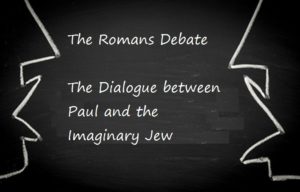 In Romans 1-4 Paul is speaking to an imaginary Jew and the style of communication Paul employs is called diatribe. Biblical scholars Stowers and Campbell have shown from the text Paul is not speaking to the Roman Christian audience. Rather he is speaking to what commentators regularly describe as a Jewish interlocutor. I call him ‘IJ’ (imaginary Jew) for short.
In Romans 1-4 Paul is speaking to an imaginary Jew and the style of communication Paul employs is called diatribe. Biblical scholars Stowers and Campbell have shown from the text Paul is not speaking to the Roman Christian audience. Rather he is speaking to what commentators regularly describe as a Jewish interlocutor. I call him ‘IJ’ (imaginary Jew) for short.
I want to speak about how Romans 1 and 2 relates to this imaginary Jew, ‘IJ’.
This post is part of my SIMPLY ROMANS series.
Passage and Comments
There is a lot happening in the first few chapters of Romans. There are some facts that are easy to miss. I’ve made the following string of arguments in my series titled dialogue with a Jew.
- Paul spoke the text aloud in front of his scribe Tertius who wrote it down (Rom 16.22; 11.13).
- The Roman audience had the text read out aloud in front of them.
- The Roman audience consisted of Jewish and Gentile believers (Rom 1.8).
- An unassisted forward reading of the Romans 1-4 is contradictory and confusing because
- In the letter Paul is speaking to an imaginary Jew (IJ) in front of the Roman believers (Rom 2.17, cf 2.1-29).
- The interaction between Paul and IJ dominates most of Romans 1-4
- a) Paul and IJ speak to one another (cf. Rom 3.1-9; 3.27-4.1).
- b) Paul is responding to IJ who has judged Greeks (cf. 1.18-32; 2.1-5; Rom 3.9b).
Drawing on the two scholars Stowers and Campbell I’ll give two points which frame how I read Romans 1-4. Firstly, in Romans 1 Paul says;
8 First, I thank my God through Jesus Christ for all of you, because your FAITH is proclaimed in all the world. (Rom 1.8)
Point 1) Paul is not addressing sinners in the hope of converting them to the Christian faith. Paul’s intended Roman audience consists of believers in Jesus Christ.
This means they have already heard the gospel and are beneficiaries of all the benefits associated with believing. According to my diagram below I locate them at C3.

In Romans 5.1-11, Paul makes known to them what is already true. They are already righteous in the sight of God, indwelt by the holy Spirit, have peace with God and reconciled to God.
This means we need to consider how Romans 1-4 applies to this faithful audience and their needs in the historical context they are in. It’s not about how they can be saved, because in Paul’s mind they have already been saved (cf. Eph 2.8-9).
My next point. In Romans 2 Paul says;
17 But if you call yourself a Jew and rely on the law and boast in God 18 and know his will and approve what is excellent, because you are instructed from the law; (Rom 2.17-18)
Point 2) The text of Romans 1.18-4.23 is dominated by a dialogue between Paul and an imaginary Jew and this would have been made clear in the reading of the text.
Romans 1-4 has a dialogue between Paul and an imaginary Jew. The audience of the letter is meant to know the interchange is happening between these two parties. They are meant to see it happening.
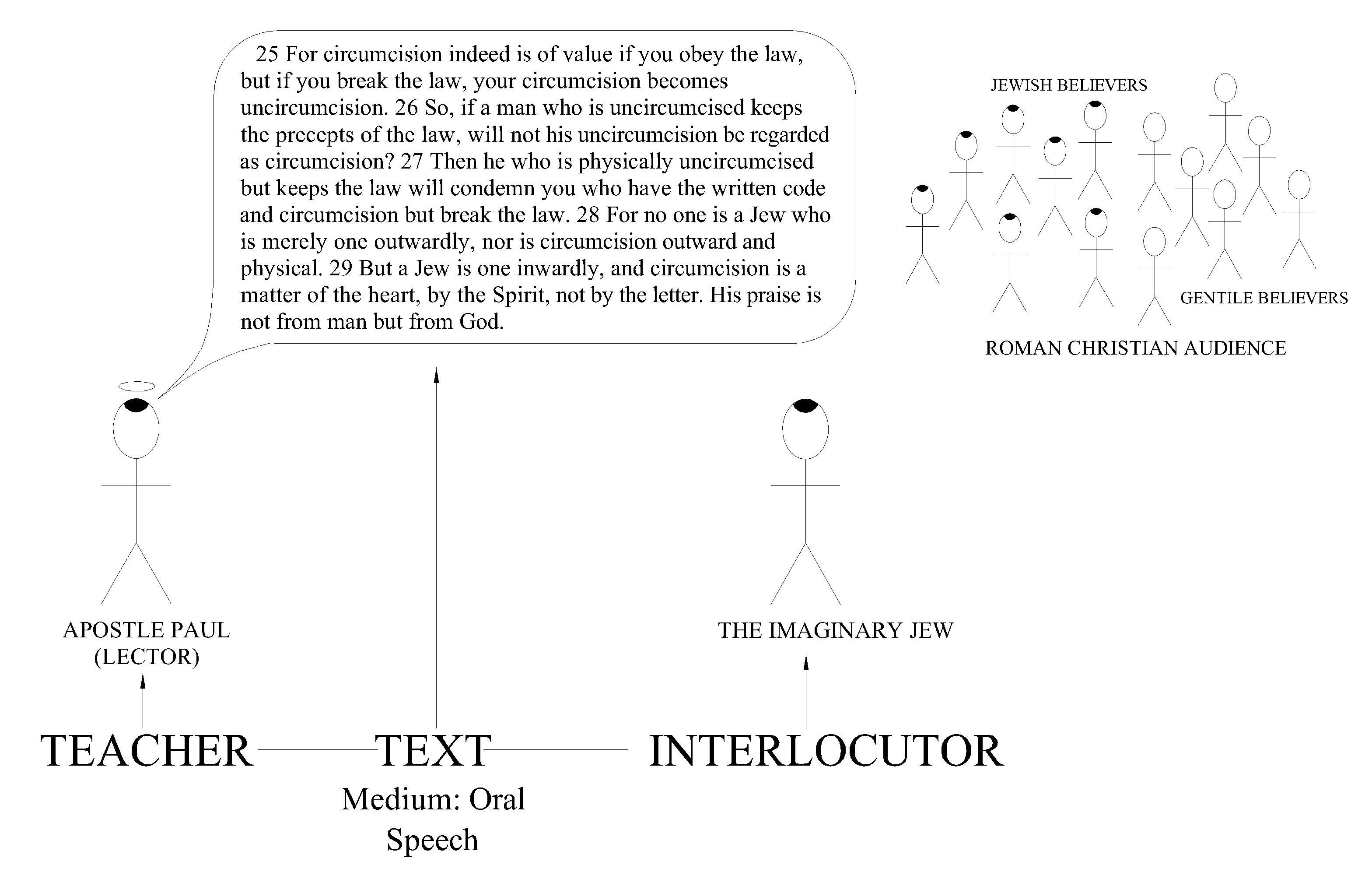 In this post I’ve made it easier to conceptualize what is happening by showing the text in cartoon form highlighting the important relationships between who is speaking and who is spoken to.
In this post I’ve made it easier to conceptualize what is happening by showing the text in cartoon form highlighting the important relationships between who is speaking and who is spoken to.
Let’s begin.

Paul will show later (Rom 2.1-5) he knows IJ is listening is (see my series), so I’ve drawn him in.
Paul says ‘for’ and it might imply to some his statement is part of a continuing argument. I’ve argued before sometimes Paul used the conjunction at times to start new arguments, not continue old ones. That is what Paul has done here.
Paul says God is angry. His wrath is revealed in the world. God wrath is his just reaction to sin, ungodliness and unrighteousness.
Gods character epitomizes love and justice. When God sees something good he reacts with pleasure. When God sees sin and unrighteousness he reacts in holy anger. Both are responses of God to what can happen in his creation.
Scripture testifies to the fact that God reveals himself through creation (Ps 19.1-6; Acts 14.15b-17; 17.24-27; Rom 10.18). Because God has revealed himself, they have no excuse for turning away from him.
Paul explains why God is so angry. Despite revealing himself to them through creation. This other group – ‘they’ – suppress the truth of God’s existence, disrespect Him and worship images of men, birds, animals and creeping things.
There is scholarly agreement that Rom 1.18-32 is a paraphrase of the Wisdom of Solomon (Ch 13-14) containing a strong Jewish indictment against ungodly and unrighteous ‘men’. Would this have been recognisable to the Roman believers? We don’t know.
See the Excursus – Wisdom of Solomon for a comparison of the two texts.
A careful examination of chapter 12 of Wisdom shows the ‘ungodly’ and the ‘men’ (Wis 12.9) are those who ‘dwelt of old in the holy land’ (Wis 12.3). In the context of chapters 12 and 13 the author of Wisdom is speaking about the non-Jewish (Gentile) nations, particularly those whom Israel drove out when entering the promised land. If Paul is drawing from Wisdom he is paraphrasing chapters 12 and 13 to likewise condemn unbelieving Gentiles.
Romans 1-4 does not condemn the Roman audience. Paul here is condemning another group (‘their’, ‘them’, ‘they’).
(Another of the biggest mistakes about Romans 1-4 is the assumption Paul is condemning his audience. Paul does no such thing. He commends their faith. cf. Rom 1.8).
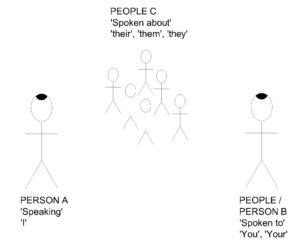 The text clearly uses the pronouns ‘their’, ‘them’ and ‘they’. Who are the ‘their’, ‘them’ and ‘they’ Paul refers to?
The text clearly uses the pronouns ‘their’, ‘them’ and ‘they’. Who are the ‘their’, ‘them’ and ‘they’ Paul refers to?
Paul is not speaking about IJ. He is not speaking about the Roman believers he has praised. Echoing IJ’s judgment (Rom 2.1-4) Paul is condemning the unrighteousness of Gentiles.
At the start Paul said God’s wrath against ungodliness and unrighteousness is revealed. That means He is expressing his wrath and punishing people now and a person could see it. How is God doing this? What should we be looking for?

God expresses his wrath by giving the unrighteous Gentiles up to more and more sin.
Which also means God holds some people back and prevents them from sinning. At this point Paul lists homosexual passions as one expression of God’s wrath on sinners. He will list more expressions of God’s wrath shortly.

Paul gives one massive list of sins that God gives sinners up into as an expression of his wrath.
From Romans 2 and onwards it is clear Paul is speaking to someone other than the Roman audience. Paul is speaking to an interlocutor. The discussion with the interlocutor dominates Romans 1-4. So the identity and agenda of the speakers should get our attention.
Paul says of IJ;
‘Everyone one of you who judges’ (Rom 2.1a), ‘In passing judgment on another you condemn yourself’ (Rom 2.1b) and ‘you who judge’ (Rom 2.3).
The first thing we learn about IJ is that he judges Gentiles. Paul takes issue with his judgment.
I’m sure Paul and IJ were in complete agreement with the condemnation of unrighteous Gentiles (Rom 1.18-32). Paul mentions their shared agreement soon afterward (Rom 2.2). They would both be in agreement because Paul has in fact echoed IJ’s judgment on unrighteous Gentiles.
But Paul knows IJ and many other Jews are no better than those they judge. So Paul turns his attention to IJ and condemns him for his hypocrisy.
He levels the playing field between Jews and Gentiles.

Paul says God is impartial. He will render to each Jew and Gentile according to their works. For good or bad.
Those who make a practice of doing good will receive eternal life. Not only the Jews as IJ would expect but also the Gentiles.
Those who do keep on doing evil will be punished. Not only the Gentiles as IJ condemned, but also the Jews. This is a shocking message for the Jews (Rom 2.6-11).
The Jews believed the law of Moses was the only means by which anyone could know right from wrong. Paul corrects this mistaken belief arguing the good behaviour of the Gentiles shows they have some sort of moral awareness as well. Paul argues the Jews will not be protected from punishment by their possession of the law. Hearing the law is not enough, one must do the law to be found righteous when God judges all people through Jesus. If they still sin they will come under the same judgment as the Gentiles who sin, having the law will not protect them (Rom 2.12-16).
Paul argues Gentiles do not need the law of Moses to do the good the law requires. He also says hearing the law does not guarantee a favourable judgment on the Jews.
He now targets the hypocrisy of IJ and the Jews.

Jews taught the Torah (the law) in their synagogues. In another series I have gone into some detail describing the law of Moses and the concepts involved. IJ thinks of himself as a Jew and believes the law (the written word of God) gives him an advantage over all other nations. He believes God is on his side. But Paul highlights that some of the Jews steal. Some of the Jews commit adultery. Some of the Jews have stolen from temples. Not all Jews abide by what they teach. The Gentiles see their hypocrisy and blaspheme God because of it. (Rom 2.17-24)
Paul then creates a hypothetical situation reversing the expectation of IJ and other Jews who condemn all Gentiles. The sin of the Jews makes it clear they are not the righteous in God’s sight. The law of Moses, the written code will not protect them. They will be condemned. Not only by God, but by faithful Gentiles who keep the precepts of the law.
Gentiles who have been circumcised (Gen 17.10-14) in the heart by the Spirit (Dt 30.6; Eze 36.26-27) on the other hand are a different matter.
Spiritual circumcision holds together the concepts of covenant membership and moral obedience (righteousness).
These spiritually circumcised Gentiles keep the precepts of the law (ten commandments) and will be reckoned to be the true people of God. They will receive God’s praise (Rom 2.25-29).
Paul redefines the people of God using the symbols of Spirit and Circumcision. He explicitly includes the Gentiles in God’s covenant people.
This finishes this post for today.
Questions for us
As promised these questions help us consider the illocutionary acts involved in the performance of the text.
What do you think reading this section aloud would do to a group of Jewish and Gentile believers?
Remembering Paul’s earlier affirmation of their faith (Rom 1.8)
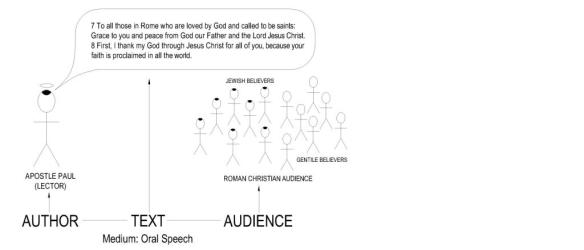
I struggle to think Paul’s opening address would convict them of their own personal sin. The references to the ‘unrighteousness of men’ and the long list of sins (Rom 1.29-32) would of course remind them of the God’s wrath, the seriousness of sin and they would seek to avoid sins like these.
I think their focus would be on the imaginary Jew and his judgment on others because Paul is speaking to him directly. They would probably recognise the interchange as a diatribe. A form of rhetoric used to teach.
What Paul says about Jews and Gentiles would get the audience to identify with the one or the other depending on their own ethnicity. They would reflect on their own behaviour and their treatment of the other ethnic group.
How do you think the JEWISH believers would respond?
I think Jewish believers would refrain from simple assumptions that all Gentiles are sinful and evil. If any believed being a Jew exempted them from God’s wrath they would be corrected.
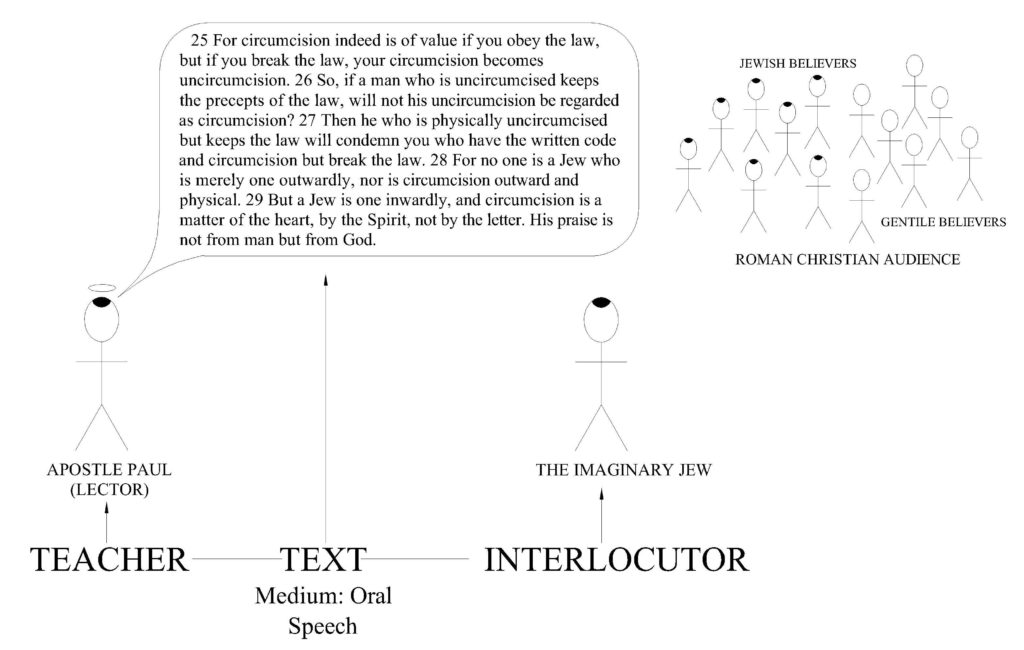 Paul puts Jews and Gentiles on level ground with one another. People who seek eternal life and do good will receive eternal life, Jews and Gentiles. Gentiles can be included in the group which receives eternal life. People who make a practice of sin and unrighteousness will be punished. Gentiles and Jews. Jews can also be condemned and come under the wrath of God.
Paul puts Jews and Gentiles on level ground with one another. People who seek eternal life and do good will receive eternal life, Jews and Gentiles. Gentiles can be included in the group which receives eternal life. People who make a practice of sin and unrighteousness will be punished. Gentiles and Jews. Jews can also be condemned and come under the wrath of God.
Their ethnicity and the law of Moses do not undo the consequences of their sin. Paul corrects wrong assumptions here.
How do you think the GENTILE believers would respond?
I think Gentile believers would be affirmed in their faith and reminded of the importance in seeking good, God’s praise and resisting temptation and sin.
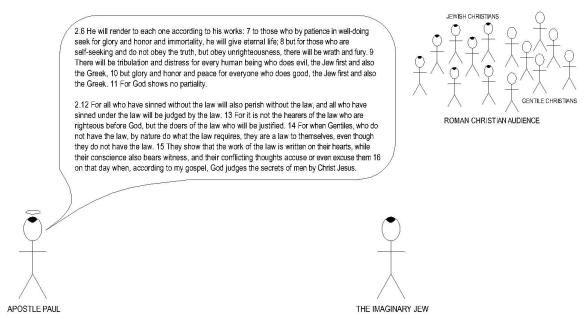
Perhaps they had been the subject of condemnations like IJ’s before and would remember how they felt. The exchange might bring up painful memories for them.
Gentile believers will be disinclined from thinking they had to adopt the law of Moses, become a Jew or be circumcised to know what good behaviour is or be praised by God. Paul speech protects them from Jews like IJ.
I think Paul’s earlier affirmation of their faith would reinforce that somehow they were on God’s good side.
What do you think the effect of saying this to an audience of Jewish and Gentile believers would have on their GROUP DYNAMICS?
Ethnic presumption is ruled out. Paul levels the playing field between Jew and Gentiles. He has started to chop Jews down a bit and raise the Gentiles up a bit. Both groups would focus on the seriousness of sin and God’s just judgment on it. What Paul says will begin the help them see each other in a new light and focus on the things that matter before God. Good and evil. Eternal life and wrath.
Why do you think Paul crafted this performance this way? What was his intent?
Paul is not speaking directly to his audience. He is communicating by way of diatribe. The interchange with IJ. The form of communication is both complex and disarming. Paul has some tough things to say and the way he does it is intended to lighten the blow. Especially to those favourable to Judaism.
Paul is not really happy with Jews like IJ who go off and judge Gentiles with no thought to their own behaviour or their own people’s behaviour. I think it was happening in their historical context. He targets the Jew to directly address this issue.
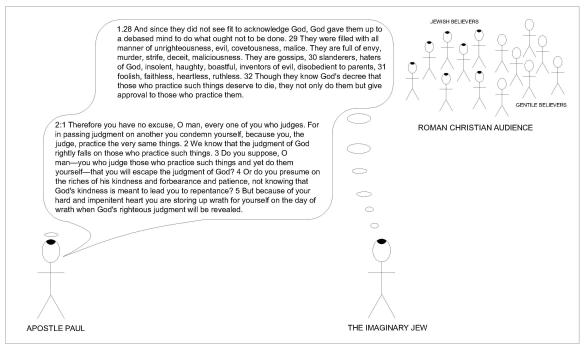
Paul plays on Jews and Gentiles throughout to get his potential mixed audience to view each other in a different light.
Words for Believers

In the gospel Jesus warns against judging others.
7 “Judge not, that you be not judged. 2 For with the judgment you pronounce you will be judged, and with the measure you use it will be measured to you. 3 Why do you see the speck that is in your brother’s eye, but do not notice the log that is in your own eye? 4 Or how can you say to your brother, ‘Let me take the speck out of your eye,’ when there is the log in your own eye? 5 You hypocrite, first take the log out of your own eye, and then you will see clearly to take the speck out of your brother’s eye. (Mt 7.1-5)
IJ blindly judged all Gentiles and did not consider the plank in his own eye. IJ assumed the Jews were immune from God’s judgment. He could not be more wrong.
God is impartial. He will treat all Jews and Gentiles the same. God will give eternal life to Jews and Gentiles who do good. God will punish all Jews and Gentiles who do evil.
Gentiles can be right with God, do good works and receive eternal life.
Paul raises the point that uncircumcised Gentiles who keep the precepts of the law will turn the tables on Jews like IJ. In a dramatic reversal, the Gentile judged by the Jew will condemn the Jew in the end and be praised by God.
Beware religious presumption and judgment. This is Paul’s shocking message. God is impartial he renders to all according to their works. For good works and bad. For Jews and Gentiles.
Click here to go to the next post in the series.
Copyright © Joshua Washington and thescripturesays, 2015. All Rights Reserved.
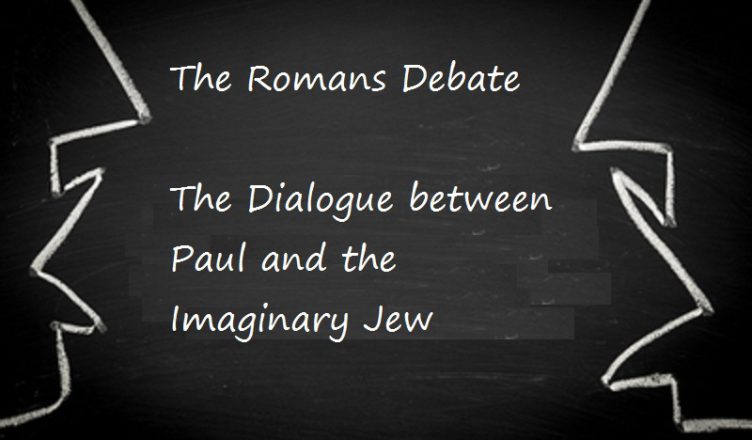


I want to recall a powerful verse Genesis 1:1 and the Spirit of the Lord hoovered upon the face of the water, since am a being, I can do the bible says: creation of the brain, but my imagination is floating, can’t focus, for instant opposite world view evolution, cosmovision, law, humanistic, secularism, against Christianity. This particular start in your series, just reminds about the books of proverbs, and the dialogue of the two world system, a Galilean worked to defend Copernicism. Since, Paul is subject, imaginative Jew, is not even his pupil timothy? Do you understand opposite view in Jews and Gentiles?
Thanks Andy. Not many scholars comment on the identity of IJ. Some who do suggest it is Paul prior to his conversion.